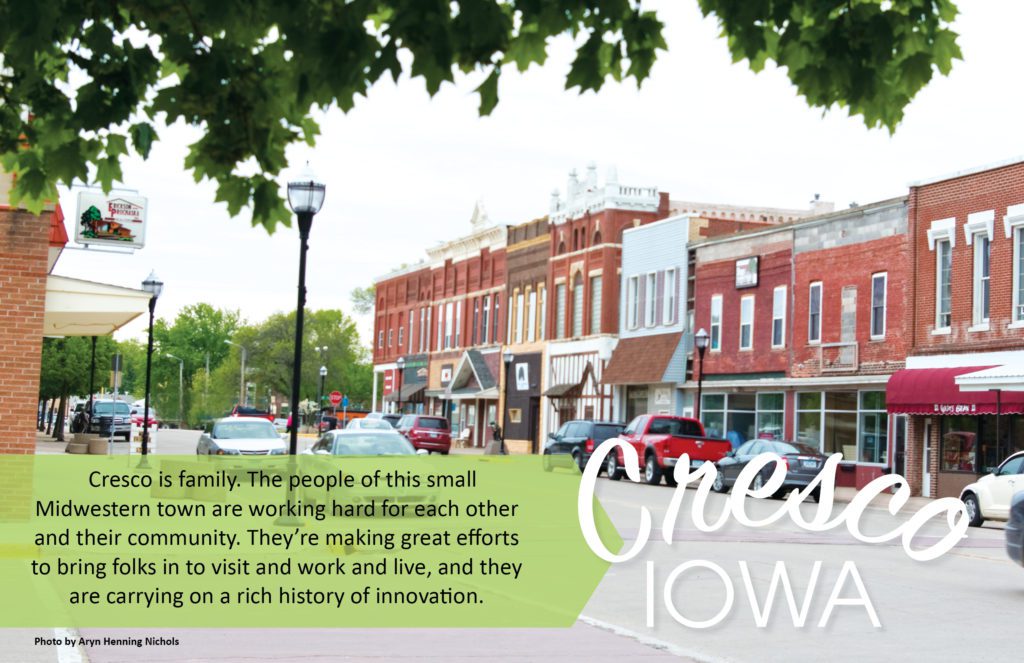Grist for the Mill: Local History
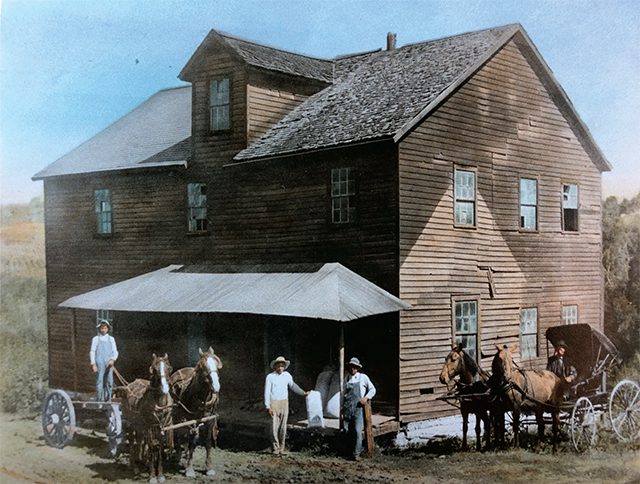
BY BENJI NICHOLS
Rich agricultural history is abundant in our region – from artifacts of Native cultures to farmsteads settled by first generation immigrants to striking gristmill buildings dotting Driftless riverbanks.
As agriculture took hold in the Midwest, settlers found crops that thrived in our area, like wheat, corn, rye, barley, oats, and more. These essential grains provided food for both settlers and livestock, but not without the necessary steps of proper harvesting and processing, including milling the grain.
The act of taking grains from their plants, then cleaning, grinding, sorting, sifting, and packaging them, has become an integrated part of our culture and of everyday foods. So much so, that we rarely think of where these grain products come from, or the great efforts it takes to produce them. But not so many years ago, many area communities had a small gristmill, and every decent river in the Driftless Region had multiple mills on it to grind the grain of local farmers. They were often family operations, like the long-gone Springwater Mill near Decorah.
In the early days, these localized mills saved farmers time and money – they didn’t have to transport their harvest, with horses and wagons – any farther than necessary. The neighborhood mill could process grains, taking a small amount of grain as payment, which might get put into barrels and shipped out, or sold in sacks to local folks, or fed to the cattle.
Very few of these mills still exist today, and only a couple of them are still intact enough to actually operate their truly antique equipment, like Schech’s Mill near Caledonia, Minnesota.
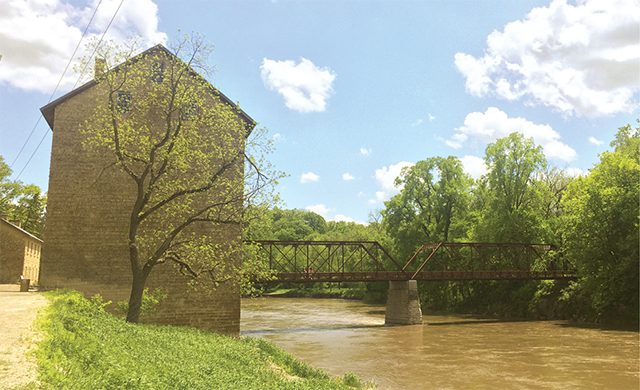
Some mills grew bigger, or started bigger with grand ideas of creating outposts in rural areas, like the Motor Mill, near Elkader. At one time Northeast Iowa’s Turkey River had over 10 working mills that served local farmers and residents. Many towns of size generally had at least one larger mill that could act as a hub for the area’s farmers, and often became a social hub as well, as everyone depended upon these structures for flour and grain.
While the days of water powered turbines are perhaps almost gone (or are they?!), a renaissance in small and artisan milling may very well be under way in the Driftless.
Schech’s Mill operates part time, milling small batches of grain for customers like Rock Filter Distillery in Spring Grove, and for weekend tours. Fifth generation mill owner Ed Krugmire can be found caretaking any myriad of tasks on the family mill site – from mowing and exterior work on the property, to mending old drive belts for various parts of the mill. Three underwater turbines still provide all of the grinding power at Schech’s, with almost all of the antiquated mill equipment intact and able to produce, but all also requiring very custom upkeep. The site is truly a fascinating time capsule into a rural mill, with wooden chutes and leather belts running machinery. To hear the slow rumble of the giant French millstones turn as a water turbine is engaged is nothing short of beautiful industrial ghost noises.
But perhaps the most interesting part to the local mill history and culture is that it continues to come full circle (no pun intended) today. As farmers have looked to diversify crops, and grow more specialty small grains for distilling, brewing, and baking, smaller mills have once again found their places in society.
Great River Milling near Cochrane, Wisconsin has been milling organic and specialty grains since 1975, and has become well known for their products across the region and country. Specialties include a variety of small grain flours, whole grain bread flours, and ancient grains.
Lonesome Stone Mill, in Lone Rock, Wisconsin is a uniquely modernized facility, making use of a refurbished cleaning mill and working closely with local growers to produce small batch grains and flours for the region. Owners Gilbert Williams and Gary Zimmer continue to find more demand for their specialty pancake mixes across the Midwest, as well as many other specialty grains and flours for artisan bakers and outlets. As small ag producers and consumers continue to seek more localized products, small milling operations may see a resurgence in our Midwestern landscape. These community outlets not only provide valuable food products, but a place where farmers and community members can cross paths.
What better way to learn about this craft than from history itself?
Here is a partial list of Driftless area mills that you can visit. Please note that almost all of these are located in rural areas, with limited hours and seasons for tours. Fall is a spectacular time to take in the countryside and enjoy these destinations, but please check ahead, and plan your route on paper, as several of these beautiful locations are off the beaten path.
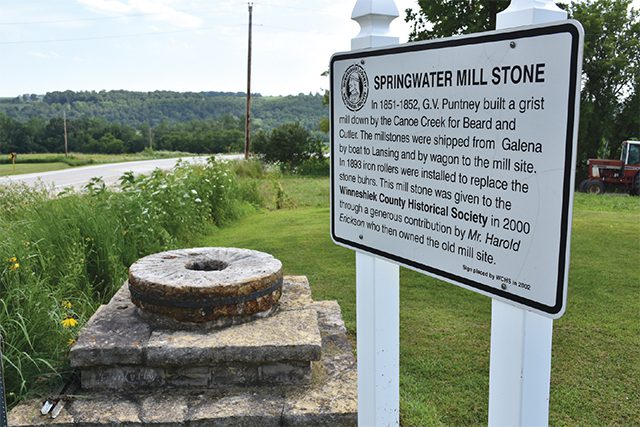
Springwater Mill
Formerly located in rural Decorah
The Springwater Mill was located just northeast of Decorah on the Canoe Creek from approximately 1851 to the late 1930s. Several families owned the mill at one time or another, including members of the Beard family, as well as both of Benji’s Great, Great, Great Grandfathers! This type of mill was often used to grind livestock feed, but could also provide a variety of ground corn and wheat products for consumption. The last remaining stone from the mill was salvaged from the defunct mill site in 2001 and placed at the Springwater Lutheran Church on Locust Road near Decorah (see photo above).
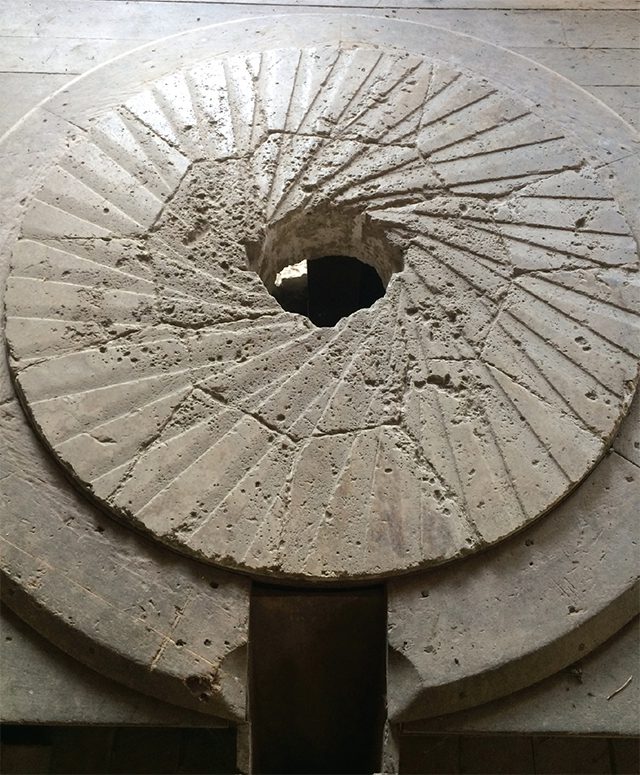
Motor Mill, Elkader
23002 Grain Rd, Elkader, Iowa 52043 • motormill.org
The Motor Mill is an excellent example of true craftsmanship – the dream of multiple business partners who saw not just a mill, but an entire development of a town, called Motor, near Elkader, Iowa. The town never became a reality, due to the lack of rail construction that was thwarted not once, but twice by severe floods. But the gorgeous four-story limestone mill still stands on the banks of the Turkey River. Parts of the original equipment still exist, and the Clayton County Conservation Board continues to work to restore not only the Mill, but the surrounding property as well. Several events are held each year at the Mill, and tours are offered on the weekends except during winter months.
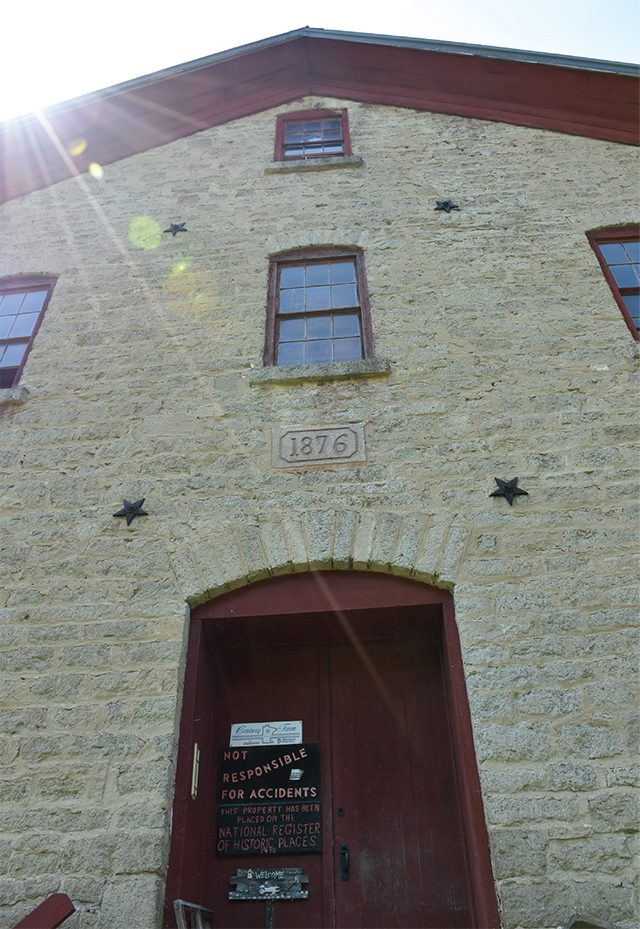
Schech’s Mill – Ed Krugmire
12559 Mill Rd, Calendonia, Minnesota
507-896-3481 or 651-245-5566 • schechsmill.com
Schech’s Mill is possibly the best ‘living’ example, and one of the only remaining water-powered mills still operating in Minnesota. Construction started on the mill in 1876, but wasn’t finished until close to 1880, after the Schech family took over the site. The “Caledonia Roller Mills,” as it was previously named, operated for many decades, and passed through multiple family hands. In 1965 the family realized it had a unique structure and began offering tours – which continue to this day. Leather belts dance through wooden elevator shafts, and almost silent water turbines turn to power the 48-inch, 1,000-pound French quartz millstones. Schech’s is truly a unique view into the past, which Ed Krugmire continues to care-take as the last of the Schech lineage. Tours are available Friday-Sunday and by appointment.
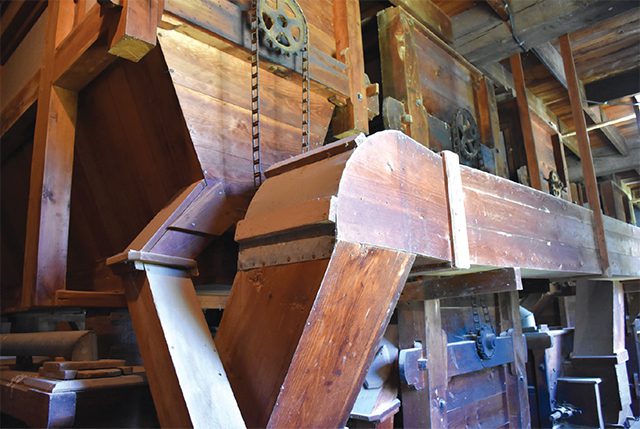
Pickwick Mill
24813 County Rd 7, Winona, Minnesota
507-457-0499 • www.pickwickmill.org
The Pickwick Mill, just outside of Winona, Minnesota is another incredibly picturesque building and setting. On the banks of the Big Trout Creek, this mill was complete in 1858, first as a sawmill, and then a gristmill. It was the first commercial flour mill west of the Mississippi, and supplied over 100 barrels of flour a day to the Union Army during the Civil War. The limestone and timber frame mill features a 20-foot water wheel, and restored milling equipment. Tours are available generally May through October, Tuesday through Sunday, with the annual Pickwick Mill Day, second Saturday each September (September 14, 2019).
Lidtke Mill
14969 Mill Rd, Lime Springs, Iowa
563-566-2828 or 563-566-2310
The Lidtke Mill was completed in 1857, and was used in one form or another for almost a century. Sited on the Upper Iowa River, northwest of Cresco, Iowa, near the Minnesota border, the Mill is now part of a 10-acre park complex in Lime Springs. Much of the original equipment is left just as it was when operation ceased in 1960 at the mill. An interesting feature of this mill is that the dam site was also used to create electricity in the 1920s, and the “Dynamo Room” can still be viewed. The Lidtke family home is located on the site as well and is included as part of the tour with many original furnishings. The mill is open on weekends through Labor Day 1-4 pm.
Wapsipinicon Mill Museum
110 1st St. West, Independence, Iowa
319-334-4616
In Independence, Iowa – alongside the Wapsipinicon River, sits one of the largest Gristmills left in the state of Iowa. Home to the Buchanan County Historical Society, the 1867 structure is now a milling museum with unique displays about early agriculture in the region as well as pioneer artifacts, and more. The five-story building was a project of businessman Samuel Sherwood, who also patented a design for the turbines that would power the mill. It’s open through mid-September from 12-4 pm daily (closed Mondays).
Interested in trying products from modern day small stone ground mills?
You’ll find these unique products to be a bit different (and often better!) than commodity store-bought versions. Stone milling retains much of the germ and bran from grains, giving them more nutritional value, antioxidants, and vitamins and minerals. Check out these regional sources for amazing, locally grown and milled products!
Lonesome Stone Mill
304 S. Oak St, Lone Rock, Wisconsin
608-583-2100 • www.lonesomestonemilling.com
In 2009 Gilbert Williams and Gary Zimmer purchased a cleaning mill in Lone Rock, Wisconsin to help sort local cover crops. It soon became known that the Clipper 29D seed cleaner was running again, and a variety of small grains began showing up. Enter another young, local farmer – Jeremy Lynch, who shared his home-milled mix of rye and wheat pancake mix, and it didn’t take long before things really ramped up! Lonesome Stone now produces several types of grain flours on their modern Meadows Mill 30-inch stone mill, as well as their custom pancake mixes, which can be found at their storefront and across Central Wisconsin and beyond.
Great River Organic Milling
Cochrane, Wisconsin
www.greatrivermilling.com
Great River Organic Milling has been providing stone milled products since 1975, all from the “Western Coast” of Wisconsin, near Cochrane. The company offers several organic flour blends and specialty products, including a line of ancient grains, and gluten free flours. Products can be found online as well as through retailers across the Upper Midwest, including many co-ops and natural food outlets, as well as larger grocers and warehouse clubs.
Benji Nichols has been captivated by stone mills and small grains since a sidetrack to California in his early 20s. While spending a year working for Grindstone Bakery, he learned much about ancient grains, small batch milling, and baking naturally leavened breads. 20 years later, the interest is as vivid as ever as more diverse small grains become common across the Midwestern regenerative landscape. A recent book, Grain by Grain by Bob Quinn and Liz Carlisle, has fully re-sparked his interest in what the future of small grains and localized mill processing could look like.
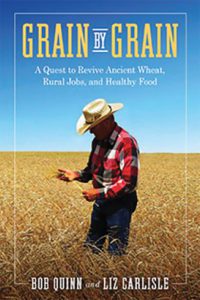
CHECK IT OUT:
Grain by Grain, Bob Quinn & Liz Carlisle.
A Quest to Revive Ancient Wheat, Rural Jobs, and Healthy Food.
islandpress.org/books/grain-grain







